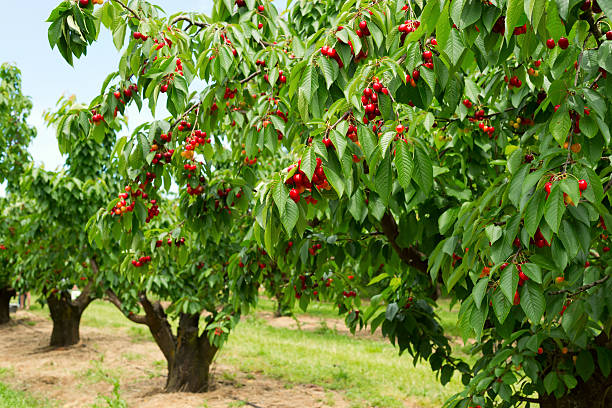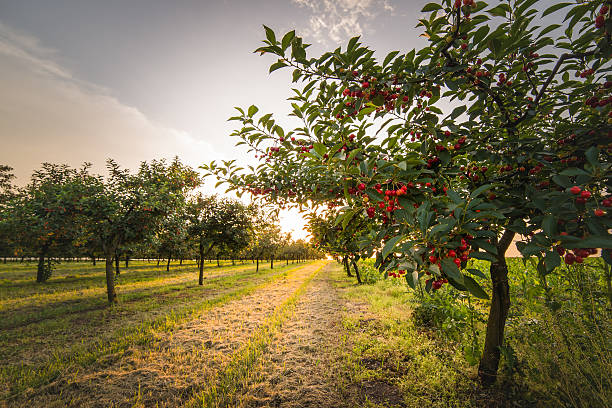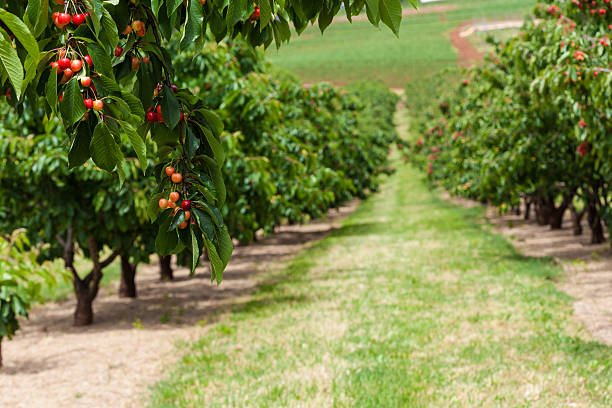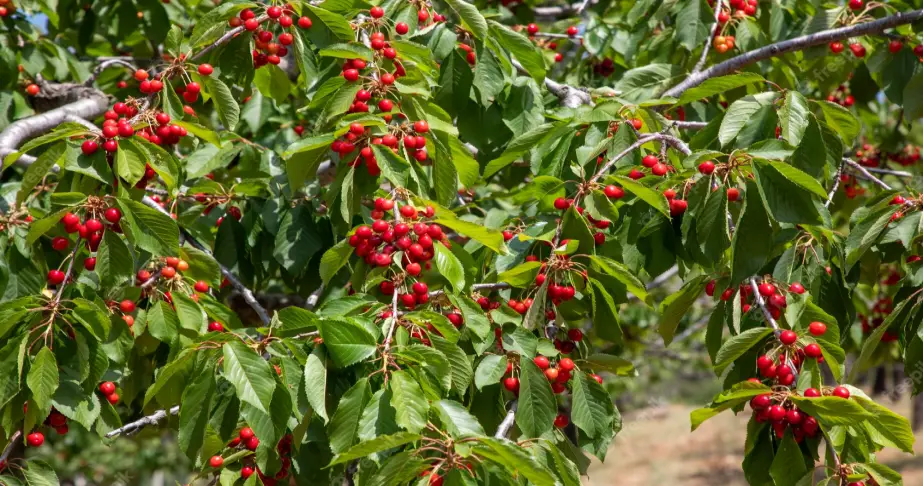Cherry trees are not only captivating with their delicate blossoms and graceful branches, but they also bless us with succulent fruits that tantalize our taste buds.
Whether you have a sweet tooth for cherries or simply appreciate the aesthetic allure they bring to your landscape, one thing remains clear: these trees deserve the best care possible.
And when it comes to their health and productivity, there’s a secret ingredient that can make all the difference – the right mulch.
Best Mulches for Cherry Trees

Organic Mulch Options
1. Wood Chips and Bark Mulch
They offer several benefits that make them suitable options.
Firstly, they excel at retaining moisture in the soil, reducing the need for frequent watering and helping to prevent drought stress in cherry trees.
They also act as a natural weed suppressor that prevents weed growth around the base of the tree and minimizes competition for nutrients.
These mulches gradually release nutrients into the soil as they decompose, enriching the soil and providing essential elements for the tree’s growth.
However, it’s important to avoid using fresh wood chips, as they can temporarily deplete nitrogen from the soil during the decomposition process.
Opt for aged or composted wood chips for optimal results.
Pros
- They create a protective layer that helps retain soil moisture by reducing evaporation. This is especially beneficial during hot and dry periods
- The dense texture of wood chips and bark mulch acts as a natural barrier, preventing weed growth and minimizing competition for nutrients
- As they decompose, they release nutrients slowly into the soil, providing a steady supply of essential elements for the cherry tree’s growth
Cons
- Fresh wood chips and bark mulch can temporarily deplete nitrogen from the soil during the decomposition process. This can affect the availability of this vital nutrient for the cherry tree and other plants nearby. Use aged or composted wood chips to minimize this issue
Related: Is Straw Good Mulch for Fruit Trees?
2. Straw and Hay
Straw and hay mulches are effective at retaining moisture and suppressing weeds around cherry trees.
They create a protective layer that helps regulate soil temperature, keeping it cooler in hot weather and providing insulation during colder periods.
These mulches also break down relatively quickly, adding organic matter to the soil and improving its structure.
However, because of their rapid decomposition, they may require more frequent replenishment compared to other mulch types.
Make sure the straw or hay used is free from weed seeds to avoid unwanted weed growth.
Pros
- They have excellent water-holding capacity, which helps to keep the soil consistently moist and reduces the frequency of watering
- Straw and hay create a thick layer that acts as a physical barrier, preventing weed growth and reducing competition for resources
- These mulches break down relatively quickly, add organic matter to the soil, and improve its structure and fertility
Cons
- They decompose faster compared to other organic mulches. As a result, they may require more frequent replenishment to maintain their effectiveness in weed suppression and moisture retention

3. Leaves and Compost
Using fallen leaves or compost as mulch for cherry trees is an eco-friendly and beneficial option.
Fallen leaves can be collected and shredded before being spread around the base of the tree.
Shredding the leaves helps prevent matting, enhances moisture penetration, and discourages weed growth. Leaves gradually break down, adding organic matter to the soil and improving its fertility.
Compost, whether homemade or commercially available, is also an excellent choice as it enhances soil structure, retains moisture, and releases nutrients over time.
It’s important to ensure that the compost used is well-aged and free from any potential pathogens.
Related: Oak Mulch Pros and Cons
Pros
- Leaves and compost, when used as mulch, improve the soil’s structure. This promotes better aeration and drainage, particularly in heavy clay soils
- As they break down, they release nutrients into the soil, enriching it and providing essential elements for the tree’s growth
- The mulches help retain moisture by reducing evaporation from the soil surface, ensuring the cherry tree has a steady water supply
Cons
- To prevent matting and facilitate quicker decomposition, leaves should be shredded or composted before using them as mulch. This additional step may require extra effort or equipment
Inorganic Mulch Options
4. Gravel and Stone
They’re suitable for cherry trees, particularly in areas prone to waterlogging or high humidity.
They provide excellent weed suppression by creating a physical barrier that inhibits weed growth.
Gravel and stones also help regulate soil temperature by retaining heat during cooler periods and reflecting excess heat during hot weather.
These mulches don’t break down, ensuring their longevity and low maintenance.
However, note that gravel and stone mulches don’t contribute organic matter to the soil.
It’s, therefore, essential to supplement the soil with organic amendments separately.

Pros
- The mulches create a physical barrier that inhibits weed growth effectively. They prevent sunlight from reaching the soil, which minimizes weed germination and growth
- They can help regulate soil temperature by retaining heat during cooler periods and reflecting excess heat during hot weather
- Unlike organic mulches, they don’t decompose; this makes them long-lasting and require minimal maintenance
Cons
- They may not improve soil fertility or structure over time since they don’t break down or contribute organic matter to the soil
Related: Best Mulches for Peach Trees
5. Rubber Mulch
Rubber mulch, made from recycled tires, is a durable and long-lasting option for mulching cherry trees.
It effectively retains moisture in the soil and reduces the need for frequent watering.
Rubber mulch also acts as a weed suppressor that prevents weed growth around the base of the tree.
It requires minimal maintenance and doesn’t decompose like organic mulches. However, it doesn’t contribute nutrients to the soil.
If using rubber mulch, supplement the soil with appropriate organic amendments or fertilizers to ensure the cherry tree receives essential nutrients.
Pros
- It’s highly durable and can last for many years without the need for frequent replacement
- It requires minimal maintenance, as it doesn’t decompose or require replenishment like organic mulches
- The mulch effectively retains moisture in the soil and helps suppress weed growth
Cons
- It can be more expensive compared to other mulch options
- The mulch doesn’t release nutrients into the soil as it doesn’t decompose. Fertilizer or organic amendments may be necessary to provide essential nutrients for the cherry tree’s growth
6. Landscape Fabric
Landscape fabric is a synthetic mulching option that acts as a barrier against weeds, helps retain soil moisture, and regulates soil temperature around cherry trees.
It effectively prevents weed growth by blocking sunlight and limiting weed seed germination.
Landscape fabric also helps conserve moisture by reducing water evaporation from the soil surface.
However, one consideration is that it may hinder nutrient exchange and soil aeration.
Therefore, it’s crucial to provide additional organic matter and periodically monitor the soil’s nutrient levels when using it as mulch.
Pros
- It acts as a barrier that prevents weed growth by blocking sunlight and impeding weed seed germination
- The mulch helps retain soil moisture by reducing evaporation, ensuring the cherry tree has a steady water supply
- Once properly installed, it requires minimal maintenance
Cons
- The mulch may hinder the exchange of nutrients between the soil and the atmosphere. It can restrict the flow of air and water, potentially affecting soil aeration and nutrient availability
- It may impede the natural aeration of the soil, which can negatively impact root health and overall tree growth
Related
- Best Gravels to Walk on Bare Feet
- 10 Best Mulch for Wet Areas
- Top 7 Disadvantages of Decomposed Granite
- Grass Mulching Pros and Cons
- Gorilla Hair Mulch Pros and Cons
- Best Mulch for Perennials
- Where to Get Wood Chips for Gardens
- Best Mulch for Raised Vegetable Bed Garden
- Top 10 Wholesale Mulch Suppliers
- Top 10 Places Where to Buy Roof Gravel
- Best Cedar Mulch for a Vegetable Garden
- 5 Best Mulches for Apple Trees
- 6 Best Mulches for Peach Trees


